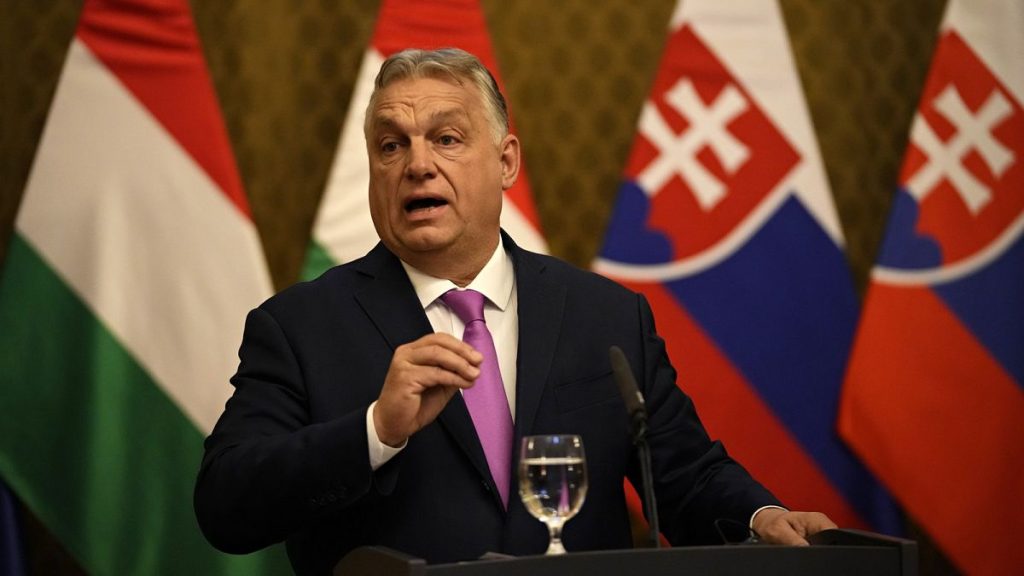The European Union’s meticulously constructed sanctions regime against Russia, a cornerstone of the bloc’s response to the invasion of Ukraine, faces a potential unraveling due to Hungary’s escalating criticism and threats to veto their renewal. These sanctions, encompassing a wide range of sectors from energy and technology to finance and luxury goods, represent a significant economic pressure point on Moscow. However, their continuation hinges on unanimous support from all EU member states, a requirement that Hungary is leveraging to challenge the efficacy and appropriateness of the sanctions, particularly in light of the upcoming US presidential transition.
Hungary’s arguments against the sanctions revolve around the perceived disproportionate harm inflicted on Europe compared to Russia. Gergely Gulyás, a member of the Hungarian cabinet, articulated this position, asserting that sanctions that primarily damage the imposer are illogical. This stance, coupled with the anticipated change in US leadership with the inauguration of Donald Trump, has prompted Hungary to call for a reevaluation of the EU’s long-term policy towards Russia and the automatic six-month renewal mechanism for sanctions. This questioning of the automatic renewal process signifies a departure from the established norm, raising concerns about Hungary’s intentions and the potential repercussions for the EU’s united front against Russia’s aggression.
Prime Minister Viktor Orbán echoed this sentiment, criticizing the sanctions as engineered by Brussels bureaucrats and calling for change. While neither Orbán nor Gulyás explicitly stated their government’s voting intentions regarding the sanctions renewal, their public pronouncements suggest a potential veto, a move that would have profound implications for the EU’s response to the war in Ukraine. The upcoming meetings of EU ambassadors and foreign affairs ministers will likely provide more clarity on Hungary’s position and the potential ramifications for the bloc’s sanctions policy.
A crucial factor influencing Hungary’s decision could be recent statements from Donald Trump, who threatened to impose significant taxes, tariffs, and sanctions on Russia if Putin refuses to negotiate with Ukraine. This hawkish stance from the incoming US president could provide leverage for Hungary to negotiate concessions from the EU or to justify maintaining the current sanctions regime. However, a Hungarian veto would have far-reaching consequences, potentially leading to the collapse of the most impactful sanctions imposed on the Kremlin and jeopardizing the multi-billion loan provided to Kyiv, which is backed by the frozen assets of the Russian central bank.
The European Commission, while refraining from pre-empting the discussions among foreign affairs ministers, emphasized the purpose of the sanctions: to hold Russia accountable for its actions and to ensure it bears the financial burden of its aggression. The Commission also pointed to Russia’s weakening international standing, referencing the recent political upheaval in Syria, a close ally of Putin, as evidence that the sanctions are having an effect. The focus now shifts to the upcoming deliberations within the EU, where the fate of the sanctions regime and the bloc’s collective response to the war in Ukraine hang in the balance.
Beyond Hungary, the EU is also monitoring Slovakia, whose prime minister, Robert Fico, has clashed with Ukrainian President Volodymyr Zelenskyy over the halt of Russian gas transit through Ukraine. Fico’s threat to use his veto power in retaliation, coupled with his recent meeting with Orbán, adds another layer of complexity to the situation. Both Orbán and Fico have maintained communication with the Kremlin and have met with Putin, actions that have drawn criticism. Their shared opposition to Ukraine’s NATO membership further underscores their divergence from the prevailing EU stance, raising concerns about the potential for further disruption within the bloc as it grapples with the ongoing war and its implications for European security and stability.










